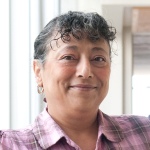Smadar Cohen

Affiliations
Ben-Gurion University of the Negev
Biography
Smadar Cohen explores new strategies to promote tissue regeneration after injury and advance regenerative medicine as a therapeutic strategy for untreatable diseases. She develops tools, such as bio-inspired materials for promoting tissue regeneration; advanced perfusion bioreactors, with mechanical and electrical stimulation for tissue engineering; and intelligent nano-sized delivery systems for therapeutics. Cohen recieved PhD from Tel Aviv University and performed post-doctoral training at MIT with Robert Langer. At BGU, Cohen founded the Department of Biotechnology Engineering and the Regenerative Medicine and Stem Cell (RMSC) Research Center. Cohen received prestigious prizes; The Rappaport Prize for Outstanding Achievements in Biomedical Research; The Teva Founders Award for Breakthrough Research in Bio-Medical Sciences and Contribution to Science and State of Israel, among others. One of her inventions, an injectable biomaterial implant for treating damaged heart muscle after acute myocardial infarction (heart attack) is now tested in pivotal clinical trials.
Abstract
Bio-inspired materials for regenerative medicine: from basic science to bedside
Smadar Cohen
Enhancing tissue self-repair via the application of instructive biomaterials is a main goal in regenerative medicine. I will describe the synthesis of bio-inspired materials designed to instruct tissue repair by presenting regeneration-inducing factors in a manner mimicking their natural presentation, i.e., via affinity binding to the matrix.
With such materials, we developed a bilayer hydrogel system to simultaneously induce the endogenous regeneration of hyaline cartilage and subchondral bone. The top layer hydrogel spatially presented the chondro-inductive transforming growth factor-b1 and the bottom layer the osteo-inductive bone morphogenetic protein-4 (BMP-4). Injection of the bilayer system (with no cells) into a subchondral defect in pigs induced the endogenous regeneration of articular cartilage and the subchondral bone underneath. The results indicate that stem cells migrating into the defect are able to sense the biological cues spatially presented in the hydrogel and respond by differentiation into the appropriate cell lineage.
The therapeutic efficacy of the instructive biomaterials as well as their ease of formulation and delivery by non-invasive method indicates that this strategy would have a real translational potential in regenerative medicine

